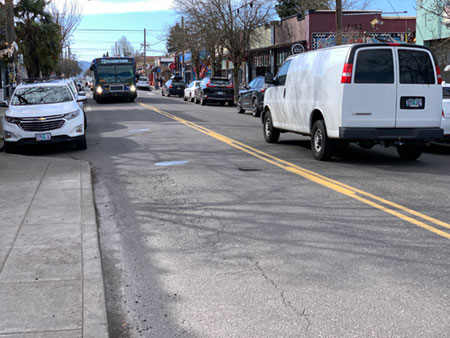By Garlynn Woodsong | CNA Board Member, SW1 CNA LUTC Chair

In May 2016, Portlanders voted to add a dime to the price per gallon of gasoline within city limits to raise money to fund city streets.
Since 2016, $64 million has been raised to fund street repairs and safety improvements, including:
- 40 miles of road paving through more than 400 “base repair” heavy-duty street rebuild projects
- 27 new wheelchair-accessible sidewalk ramps to meet Americans with Disabilities Act standards
- 58 intersection safety upgrades
- 79 Safe Routes to School projects, serving at least 31 elementary schools, eight middle schools and 10 high schools
- Funding toward the repaving of Alberta Street from 15th to 30th avenues, expected this October
That four-year temporary tax is scheduled to expire this year. Portland City Council voted unanimously Feb. 6 to refer a renewal of the Fixing Our Streets program, to the May 19 primary election ballot.
The new four-year measure is expected to fund $74.5 million of additional projects, including:
- $25 million for paving
- $4 million citywide for base repair, repairing sections of failing streets
- $4 million for maintaining Portland’s gravel streets
- $5 million for a dedicated, year-round pothole repair crew
- $5 million for new traffic signals and beacons on some of Portland’s most dangerous streets
- $4.5 million for sidewalks
- $4.5 million for street lighting
- $6 million for Safe Routes to School projects
- $4.5 million for Neighborhood Greenway projects
- $1.5 million for Neighborhood Safety Improvements focused on saving lives and preventing injuries for pedestrians and other vulnerable road users
- $10.5 million for basic safety improvement projects
Spending under the new measure, if approved in May, will continue to be overseen by a committee, made up of representatives of multiple communities with a stake in Portland’s streets and roads.
When the original gas tax was passed in 2016, it established the city’s first dedicated fund for street repairs and safety improvements. At that time, the city faced a $2 billion street repair backlog. The Heavy Vehicle Use Tax that was passed at the same time on companies operating trucks more than 13 tons to ensure they also paid their fair share for road repairs, has since raised $8 million.
Garlynn Woodsong lives on 29th Avenue, serves on the CNA board and is an avid bicyclist. He also is a dad who is passionate about the city his son will inherit. He is the planning + development partner with Cascadia Partners LLC, a local urban planning firm. Contact him at LandUse@ConcordiaPDX.org.